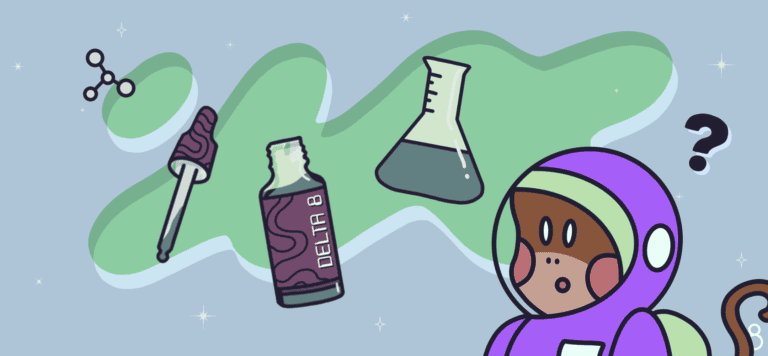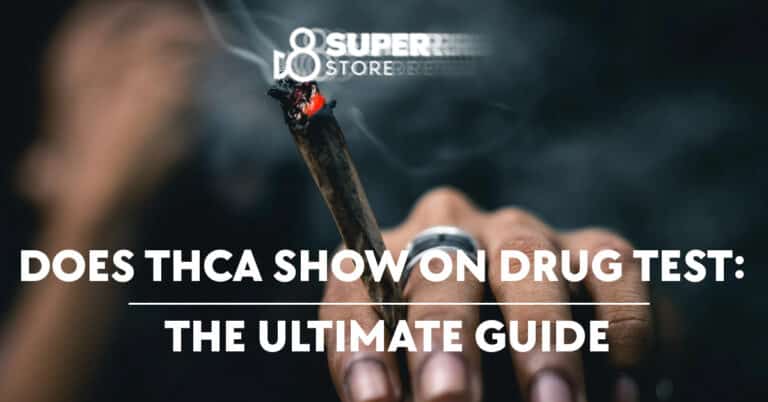Is Delta 11 THC Legal in Ohio? State Law Clarifications for 2023
Diving right into Ohio’s twist on Delta-11 THC, you gotta know how both the big guys (national laws) and local rules play a dance around cannabis derivatives. Think of Delta-11 THC as the cousin of Delta-9 THC, the ingredient in weed that really lets you fly, and its buddy Delta-8 THC. Everyone’s talking about it. With new cannabinoids on the block, Ohio is reshuffling its legal deck.
As you navigate Ohio’s legal landscape, you should be aware that the state follows the federal Agricultural Improvement Act of 2018, more commonly known as the Farm Bill. This has legalized hemp-derived compounds containing less than 0.3% Delta-9 THC on a dry-weight basis. However, the legality of Delta-11 THC is not as clear-cut, since state laws can be more restrictive and specific definitions and allowances for cannabinoids may vary. It’s recommended to refer to the most current state legislature or seek legal advice for the most up-to-date information on the legal status of Delta-11 THC in Ohio.
Table of contents
- Legality of Delta 11 THC in Ohio
- Overview of THC and Its Isomers
- Federal and State Law Comparison
- Hemp Production and Regulation
- Medical Marijuana and Controlled Substance Act
- Implications for Consumers and Businesses
- Interstate Comparison of THC Isomer Legality
- Scientific Research and Development
- Consumer Safety and Regulatory Challenges
- Legal Outlook and Future Considerations
Legality of Delta 11 THC in Ohio
In Ohio, state law regarding cannabis is nuanced, particularly around compounds such as Delta 11 THC. As you explore the legal landscape, it’s essential to differentiate between the various cannabinoids derived from the hemp plant. Unlike Delta 9 THC, which is the primary psychoactive component in marijuana and regulated strictly, Delta 11 THC falls into a more ambiguous category.
Ohio follows federal law, specifically the 2018 Farm Bill, which legalizes all hemp-derived cannabinoids, isomers, and other derivatives, provided they contain a Delta-9 THC concentration not exceeding 0.3% on a dry weight basis. Since Delta 11 is not explicitly mentioned in controlled substances lists, and as hemp derivatives, it may theoretically have a non-illicit status if compliant with the aforementioned THC concentration limits. However, synthesizing Delta 11 may involve processes that alter its legal standing.
Legal Considerations in Ohio:
- Hemp-derived products: Legal under state & federal law if Delta-9 THC < 0.3%
- Marijuana-derived products: Controlled & illegal without a medical license
- Synthesized cannabinoids: May not be explicitly addressed, leading to legal ambiguity
Your understanding of Ohio law is crucial when purchasing or possessing any THC product. Given the legal complexities and evolving legislation, ensure to stay informed via credible resources, like An Analysis of Cannabis Law in Ohio, to avoid unintentional legal infractions regarding hemp and its derivatives. Keep in mind that while state laws may provide certain allowances, federal agencies can hold different interpretations.
Overview of THC and Its Isomers
When you’re looking into the legal status of delta-11 THC in Ohio, it’s essential to understand tetrahydrocannabinol (THC) and the various isomers derived from it. THC is the principal psychoactive component found in cannabis. Its isomers, like delta-8, delta-9, and delta-10, vary in their molecular structure and thus their effects and legal status.
THC Isomer Chemical Properties
The term “isomer” refers to molecules with the same formula but a different arrangement of atoms. THC has several isomers, including delta-8, delta-9 THC (the most abundant in cannabis), and delta-10. These isomers share a similar chemical formula: C₂₁H₃₀O₂. However, the different positioning of the carbon double bond – for delta-8, it’s on the 8th carbon; for delta-9 THC, the 9th; for delta-10, the 10th – influences their pharmacology, interaction with cannabinoid receptors, and legality. The process of altering one isomer into another is called isomerization. Delta-11 THC, less commonly discussed, is another such isomer.
- Chemical Formula: C₂₁H₃₀O₂
- Double Bond Position:
- Delta-8: 8th carbon
- Delta-9 THC: 9th carbon
- Delta-10: 10th carbon
Tetrahydrocannabinolic acid (THCa) is the non-psychoactive precursor to THC found in raw cannabis that becomes THC through decarboxylation when heated. Each THC isomer may possess a different potency level and effect profile, impacting their legal status across jurisdictions.
Delta 11 THC Vs. Other Isomers
Delta-11 THC, similar to its counterparts, has subtle structural differences that may lead to variations in effects and legal interpretation. Delta-9 THC is the most well-known and is predominantly responsible for the psychoactive effects of cannabis. Comparatively, delta-8 and delta-10 have been reported to have milder psychoactive effects.
The legality of these isomers is not always clear-cut, as it can depend on whether they are derived from marijuana or hemp, with hemp-derived cannabinoids being federally legal under certain circumstances due to the 2018 Farm Bill. However, states have their own regulations, with Ohio having specific laws governing cannabinoids and their isomers.
Your understanding of each cannabinoid and isomer’s standing should consider both the molecular properties and the legal environment. Delta-9 THC is typically subject to the strictest regulations due to its potent psychoactive properties, while delta-8, delta-10, and other isomers might occupy a more ambiguous legal space.
Federal and State Law Comparison
In this section, you’ll understand the nuances between federal and state law concerning cannabis, with a focus on how the 2018 Farm Bill has influenced legislation and the varied approaches of individual states.
2018 Farm Bill Impact
The 2018 Farm Bill fundamentally altered the legal landscape for cannabis by differentiating between hemp and marijuana based on the threshold of delta-9 tetrahydrocannabinol (THC), the psychoactive component of cannabis. This bill federal law allows for the production and sale of hemp products that contain less than 0.3% delta-9 THC on a dry weight basis. However, it doesn’t directly address the legality of delta-11 or other THC isomers, leaving a gray area that state law can interpret differently.
State-Specific Cannabis Regulations
In the United States, cannabis regulations can be highly state-specific. Here’s how some states address cannabis-derived substances:
- California: Legally recognizes and regulates cannabis for both medical and recreational use, with specific laws addressing potency and product safety.
- Colorado: A pioneer in legalizing cannabis, Colorado maintains a robust regulatory framework that includes THC isomers.
- Arizona: Mirrors other legal cannabis states with detailed legislation governing the use of cannabis products.
States that have historically had stricter cannabis laws, such as Alabama, Alaska, Arkansas, and others, may not have clear policies on newer cannabinoids, leaving potential legal risks for consumers and businesses alike.
Always consult your state’s latest legislation for the most current information, as state laws are subject to change and can significantly differ from federal legislation.
Hemp Production and Regulation
In Ohio, your understanding of hemp production and regulation is crucial, particularly as it pertains to the legal landscape of hemp-derived products such as CBD. Legislation categorizes hemp separately from marijuana based on THC content, and it is imperative that hemp products meet the legal THC thresholds established by the Ohio Department of Commerce.
Hemp-Derived Products
Hemp-derived products in Ohio must conform to regulatory standards, which include a THC concentration of no more than 0.3%. This distinction classifies hemp as separate from marijuana, rendering it legal under state law. The lab testing of these products is a critical component of their legitimacy, requiring validation by the Ohio Department of Commerce. Additionally, it’s important for you to know that the production and sale of these products, including CBD oil, are subject to state regulations.
- Legal status: Hemp products below 0.3% THC are legal
- Regulatory body: Ohio Department of Commerce
- Lab testing: Mandatory for hemp products
Your adherence to these guidelines ensures compliance with the hemp regulations. Keep in mind that non-compliance can result in legal consequences, underscoring the importance of purchasing and distributing vetted hemp-derived commodities. These substances must be processed by licensed facilities to guarantee that they meet the stringent criteria set forth by Ohio law.
Medical Marijuana and Controlled Substance Act
When exploring the legal landscape of medical marijuana in Ohio, it’s important to understand its classification under the Controlled Substances Act (CSA). Initially, you should note that the CSA categorizes drugs, substances, and certain chemicals used to make drugs into five distinct schedules. This scheduling denotes the drug’s acceptable medical use and its abuse or dependency potential.
Medical marijuana pertains to the use of the cannabis plant, or cannabinoids, for the treatment of diseases or symptoms. Although marijuana is listed as a Schedule I drug under the federal CSA, indicating a high potential for abuse and no accepted medical use, the state of Ohio recognizes medical marijuana for patients with qualifying medical conditions.
In Ohio, medical marijuana contains various cannabinoids, including delta-9-tetrahydrocannabinol (THC) and cannabidiol (CBD). The state’s medical marijuana program allows you to use these cannabinoid products within specific regulatory confines. However, it remains essential to be aware that any cannabis product containing more than 0.3% THC remains classified under federal law as a Schedule I controlled substance.
Furthermore, the 2018 Farm Bill redefined hemp and established a threshold for THC content, stipulating that cannabis plants and their derivatives must contain less than 0.3% THC on a dry weight basis to be legal under federal law. This delineation has given rise to products like CBD oils that have been removed from the federal definition of a controlled substance, as long as they adhere to this THC content threshold.
Your understanding of these regulations is crucial if you are considering the use of medical marijuana in Ohio, as this influences the legality of possessing and using such substances within the state.
Implications for Consumers and Businesses
When navigating the legality of Delta-11 THC in Ohio, as a consumer or business operator, it’s important to understand the current regulatory landscape. Ohio law permits the sale of cannabidiol (CBD) products, such as edibles, as long as they contain no more than 0.3% THC, ensuring they meet federal guidelines as described in the 2018 Farm Bill.
As a consumer, this means you can purchase CBD products from state-licensed dispensaries and other authorized retailers without fear of legal repercussions, provided these products adhere to THC content limits. Be mindful to verify the source and the THC content of your purchases to stay within these bounds.
For businesses, compliance with state regulations is critical. Ensuring your product line meets the required standards involves rigorous testing and accurate labeling. Keep abreast of changes in laws, as this diligence protects your enterprise from potential legal challenges and maintains consumer trust.
- For Consumers:
- Ensure CBD products do not exceed the 0.3% THC threshold.
- Purchase from reputable, state-licensed dispensaries.
- For Businesses:
- Regular testing to verify THC levels is essential.
- Compliance with state regulations is non-negotiable to operate legally.
Remember, while Ohio might allow certain hemp-derived products, ambiguity around newer cannabinoids like Delta-11 THC could pose risks. Always seek products that are clearly labeled and have verifiable lab results to back up their THC content claims. As regulations evolve, staying informed is your best strategy for navigating this space confidently and responsibly.
Interstate Comparison of THC Isomer Legality
When navigating the complex landscape of THC isomer legality, you will encounter a patchwork of state laws that can influence availability and enforcement.
Variations in State Enforcement
Florida has recognized the distinction between different THC isomers, but the state’s legal outlook is remains evolving. In Florida, Delta-8 THC — a derivative of hemp — is readily available and not explicitly illegal. It is critical for you to understand that while federally legal under the 2018 Farm Bill, individual states hold the authority to regulate or ban these compounds.
Idaho takes a stringent stance on all forms of THC. Any derivative, isomer, or cannabinoid that has not been approved by the FDA remains illegal within the state, including all THC isomers. This means, irrespective of its federal status, products like Delta-8 THC, and possibly Delta-11 THC, are likely prohibited.
In Oregon, the approach is markedly more permissive. Here, state laws have integrated the federal guidelines, allowing THC isomers derived from hemp with less than 0.3% Delta-9 THC concentration. If you reside in Oregon, access to THC isomers is typically not restricted by state law.
The situation in Pennsylvania is more nuanced. While the state has legalized medical marijuana, when it comes to THC isomers like Delta-8, the legal environment is less clearly defined. Staying informed about any legislative changes is paramount for Pennsylvania residents.
Lastly, if you’re in South Dakota, the legal standing of THC isomers can be quite confusing. Following a voter-approved initiative, cannabis is supposed to be medically legal, but this has faced legal challenges. Hence, it’s imperative to be on the lookout for new developments regarding state laws on THC isomers.
This complex landscape indicates that the legality of THC isomers, which includes Delta-11 THC, varies significantly from one state to another, with state laws either tightening or expanding on federal regulations. As this scenario is constantly evolving, staying updated on recent legislation in your state is crucial.
Scientific Research and Development
As you navigate the complexities of cannabinoid legality, it’s essential to understand the role of scientific research and development. This domain continuously explores the properties and potential applications of cannabinoids, including how they are synthesized and processed by the cannabis plant.
Cannabinoid Research
Research within laboratories is pivotal in understanding the breadth of cannabinoids produced by the cannabis plant. You should be aware that cannabinoids are a class of chemical compounds that act on cannabinoid receptors in cells. One key area of research is isomerization, which is the process by which one molecule is transformed into another molecule that has the same atoms, but in a different arrangement. This is particularly relevant in the case of tetrahydrocannabinols (THCs), as various forms, or isomers, such as delta-8, delta-9, and delta-10-THC, have different legal statuses.
Scientists also focus on the synthesis and study of less common cannabinoids like tetrahydrocannabivarin (THCV), which can offer insights into the therapeutic potential and regulatory considerations of cannabinoid use. The rigors of scientific methodology ensure that you receive accurate and comprehensive data regarding the safety, efficacy, and legal status of these compounds.
What you find in the lab extends well beyond basic cannabinoid profiles. Innovations in extraction and synthesis processes, along with rigorous testing protocols, are driving the development of new therapeutic agents from the cannabis plant. The advancements in cannabinoid research not only inform you about the pharmacological effects of these compounds but also guide legislation and consumer safety as the industry evolves.
Consumer Safety and Regulatory Challenges
When considering the legality of compounds such as Delta-11 in Ohio, consumer safety and regulatory frameworks are crucial elements to understand. Your awareness of the complexities in this arena is key to navigating the current landscape.
The Food and Drug Administration (FDA) has a significant role in ensuring the safety of consumer products containing cannabinoids like Delta-11. This includes the evaluation of such substances to conform with health standards and controlled substances regulations. The lack of FDA approval for many cannabis products leads to a grey area in terms of safety assurance.
| Substance | Legal Status (Ohio) | FDA Regulation |
| Delta-8 THC | Ambiguously regulated | Limited oversight |
| Delta-11 THC | Uncertain | Assessment in progress |
Delta-8 tetrahydrocannabinol (Delta-8 THC) also falls under scrutiny, with its close chemical relation to Delta-11 potentially influencing Ohio’s stance on regulatory matters. While Delta-8 may be more familiar in discussions of legality, Delta-11 sits in a more uncertain space due to its relatively new presence in consumer markets.
To navigate these complexities, it is imperative to stay informed on Ohio’s legislative actions and federal controlled substances updates. Currently, the legal status of Delta-11 in Ohio is not explicit, leaving room for interpretation and potential legal challenges. Engaging with trusted legal resources will aid in your understanding of the intricate balance between access to new cannabinoid products and the regulations designed to ensure your safety.
Legal Outlook and Future Considerations
When evaluating the legal landscape concerning Delta-11 and its status in Ohio, it’s essential to distinguish between state law and federal law. In Ohio, cannabis laws have been evolving, and the allowance for certain THC isomers, such as Delta-8, has been subject to change. However, Delta-11, as a THC isomer, is not explicitly addressed in Ohio’s current legal framework.
- State Law: At the state level, Ohio has legalized medical marijuana, but the specifics around newer THC isomers can be ambiguous. Your understanding of the law must be up-to-date, as legislative shifts could alter the legal status of substances like Delta-11 without much notice.
- Federal Law: Federally, the Controlled Substances Act regulates marijuana and its derivatives. While the 2018 Farm Bill excludes hemp-derived cannabinoids with less than 0.3% Delta-9 THC, the legality of other isomers, including Delta-11, remains unclear. Their legal status can be interpreted differently by various agencies and courts.
In terms of controlled substances, Delta-11 could fall into a gray area. Its association with THC makes its legality dependent on whether it’s derived from lawful hemp or controlled marijuana plants. With the ongoing changes and interpretations of federal law, including the regulation of cannabinoids, you should stay informed of any new developments.
With Ohio’s developing regulatory framework, it’s likely that more specific laws will be formed to address the sale and possession of cannabinoid isomers. As you consider the usage or sale of such compounds, remain attentive to local and federal updates. Keeping track of rulings and law amendments will ensure that you are acting within legal boundaries.
Frequently Asked Questions
Navigating the legal landscape of cannabinoids can be complex. This section provides clarity on the legal status, effects, safety, and testing implications of Delta-11 in Ohio.
What is the current legal status of Delta-11 in Ohio?
In Ohio, cannabinoids derived from hemp, including Delta-11, are legal as long as they contain no more than 0.3% Delta-9 THC. The Ohio legislature passed Senate Bill 57 in July 2019, legalizing hemp and hemp-derived compounds.
How does Delta-11 compare to Delta-9 in terms of effects and legality?
Delta-11 is structurally similar to Delta-9 THC, the active compound in cannabis known for its psychoactive effects, but there is less research on Delta-11’s effects and potency. Legally, Delta-11 is in a similar category as other hemp-derived cannabinoids and is treated differently from Delta-9 THC, which is illegal at the federal level but legal for medical and/or recreational use in some states, including Ohio for medical use.
Are there any safety concerns associated with the use of Delta-11?
Limited research is available on Delta-11, and its safety profile is not as well understood as that of Delta-9 THC or CBD. As with any cannabinoid, you should use caution and consider potential interactions with other medications or health conditions.
Can using Delta-11 result in a positive drug test?
Since drug tests typically screen for THC metabolites, and Delta-11 can be metabolized similarly to Delta-9 THC, it is possible that the use of Delta-11 could trigger a positive drug test result.
What are the potency levels of Delta-11 compared to other cannabinoids?
The potency levels of Delta-11 in relation to other cannabinoids such as Delta-9 THC or CBD are not well-documented due to its rarity and limited availability in the market. Generally, the potency of any cannabinoid can vary based on its formulation and the individual’s metabolism.
Is possession of Delta-11 products considered legal in the state of Ohio?
Yes, possession of Delta-11 products is legal in Ohio as long as they adhere to state laws concerning hemp-derived substances, specifically that they contain no more than 0.3% Delta-9 THC by dry weight.







